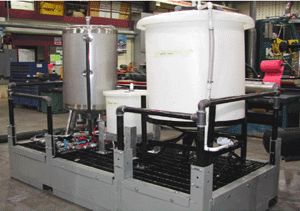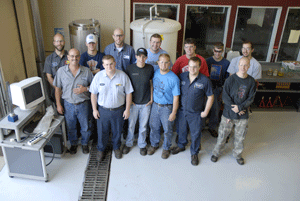MATC, UWM collaborate on biodiesel fuel reactor



October 13, 2006
An August ribbon cutting ceremony highlighted a year-long Wisconsin project to design, build, operate and study a biodiesel reactor. A collaborative effort between the University of Wisconsin-Madison (UWM) and the Madison Area Technical College (MATC), the project is part of a comprehensive renewable energy technology program at MATC, called the Consortium for Education in Renewable Energy Technologies (CERET).
The reactor was designed in the fall semester of 2005 by freshman engineering students at UWM in an interdisciplinary freshman design seminar. "[MATC] diesel instructors told students what they needed in the classroom, and UWM students set about to design the reactor and order parts," said Ken Walz, MATC project director and chemistry instructor. He collaborated with MATC Diesel Program Director Paul Morschauser, as well.
The reactor now belongs to the MATC diesel and heavy equipment program, in which fuel is produced and used in the school's fleet of heavy equipment. Initially, program members are testing B2 and B20 blends, according to Walz. In addition to measuring performance on these vehicles, the students are also operating stationary engines at a dynamometer facility to measure emissions. "They'll be doing regular-interval oil sampling to measure changes in oil composition and will also do engine dissections," he noted.
Walz's chemistry students at MATC are also producing biodiesel on a small scale and comparing its properties to vegetable oil. He said the school's fuel lab is being revamped, and it is seeking equipment donations.
MATC will get its feedstock from a variety of sources. The first batch was waste vegetable oil from a bar and grill operated by Morschauser. Walz said soybean oil will also be used, some coming from a hybrid seed project with O'Brien Farms and Great Lakes Biofuels, a B100 supplier. He added that the school cafeteria could be a source in the future.
MATC received two grants for the CERET program through the National Science Foundation that funded the project, according to Walz. He and Morschauser will work with tractor pullers when school is not in session to test biodiesel in high-performance situations.
The reactor was designed in the fall semester of 2005 by freshman engineering students at UWM in an interdisciplinary freshman design seminar. "[MATC] diesel instructors told students what they needed in the classroom, and UWM students set about to design the reactor and order parts," said Ken Walz, MATC project director and chemistry instructor. He collaborated with MATC Diesel Program Director Paul Morschauser, as well.
The reactor now belongs to the MATC diesel and heavy equipment program, in which fuel is produced and used in the school's fleet of heavy equipment. Initially, program members are testing B2 and B20 blends, according to Walz. In addition to measuring performance on these vehicles, the students are also operating stationary engines at a dynamometer facility to measure emissions. "They'll be doing regular-interval oil sampling to measure changes in oil composition and will also do engine dissections," he noted.
Walz's chemistry students at MATC are also producing biodiesel on a small scale and comparing its properties to vegetable oil. He said the school's fuel lab is being revamped, and it is seeking equipment donations.
MATC will get its feedstock from a variety of sources. The first batch was waste vegetable oil from a bar and grill operated by Morschauser. Walz said soybean oil will also be used, some coming from a hybrid seed project with O'Brien Farms and Great Lakes Biofuels, a B100 supplier. He added that the school cafeteria could be a source in the future.
MATC received two grants for the CERET program through the National Science Foundation that funded the project, according to Walz. He and Morschauser will work with tractor pullers when school is not in session to test biodiesel in high-performance situations.
Advertisement
Advertisement
Advertisement
Advertisement
Upcoming Events





